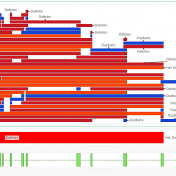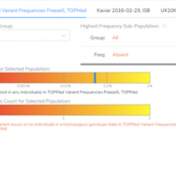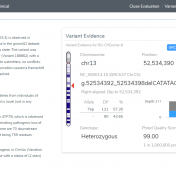Variant interpretation is a critical aspect of any clinical NGS workflow. VarSeq assessment catalogs are a tool used to save variants and associated variant information for easy tracking and retrieval of completed variant interpretations. As variant interpretations stack up and classifications are saved, storing in assessment catalogs makes it easy to automatically fill in a previous interpretation if the variant… Read more »
Assessment catalogs are a way for VarSeq users to save variants and variant information for clinically relevant variants, so when you come across this variant again in another sample, all of the work to analyze and classify the variant is already done! But there is more than meets to the eye when it comes to using assessments in VarSeq. Being… Read more »
When doing clinical variant analysis, it is often essential to keep track of the variants that are encountered in each sample, their pathogenic or oncogenic classifications, which individual created or saved an interpretation, and when. For this purpose, VarSeq prompts VSClinical users to create default assessment catalogs in which to store variants and other events. However, we are aware that… Read more »
Discover how to enhance collaboration in VSClinical by sharing variant scores and assessment catalogs through the strategic relocation of the AppData folder. A subtle but powerful utility of VSClinical concerns the ability to share variant scores between users on the same account. What I mean by that is, leveraging the location of the AppData folder, so that users are writing… Read more »
In this blog, we will be covering new assessment catalogs and how they work to improve saving and tracking variant interpretations. VarSeq is a variant analysis tool that effectively analyzes single nucleotide (SNVs) and copy number variants (CNVs) in both cancer and germline workflows. Because VarSeq enables such diverse variant analysis, there are many research labs and institutions that evaluate… Read more »
Our software solutions and partners have brought dramatic improvements to the secondary and tertiary analysis stages of variant evaluation. Regarding secondary analysis, we’ve discussed increased efficiencies in speed and overall accuracy in the variant calling process with Sentieon. On the tertiary side, we have explored numerous workflows in VarSeq highlighting filtration to clinically relevant variants, as well as the automated… Read more »
VarSeq Updated with CNV Annotations, CNV PhoRank, and Region Assessment Catalogs This year we have released multiple advances to support CNV analysis in VarSeq, expanding our target region based VS-CNV caller to handle exomes and low-depth genomes as well as additional supporting algorithms like calling Loss of Heterozygosity regions. To top this off, VarSeq 1.4.7 has been shipped with many… Read more »
Variant interpretation is an integral part of any workflow that results in some decisions being made about the validity and suspected functional impact of a variant in a given sample and their presenting phenotypes. The VarSeq Assessment Catalog functionality is designed to assist the VarSeq user in streamlining this process. To include this functionality in your workflow, you will first… Read more »
Recently, a Golden Helix customer reached out to support for advice on how to validate the variant scoring between two different VarSeq users. Here we break down one possible solution as an opportunity to showcase the utility of both the Latest Sample Assessment function and an alternative way to leverage the Compute Fields function. To set up this validation project,… Read more »
Our previous webcast demonstrated some of the new functionalities of VSClinical, including the ability to add ACMG frequency sources for the ACMG BA1, BS1, and PM2 criteria. This new feature was spurred by the feedback from our users, which requested supporting frequency tracks other than gnomAD Exomes and 1kG Phase3. Now, users can implement population catalogs to VSClinical such as… Read more »
It doesn’t take much effort to find articles discussing the value of Next-Generation Sequencing (NGS). There is a consistent tone amongst authors that implementing NGS pipelines are critical for clinical efficiency in both hereditary disorders and somatic. However, NGS strategies do not come without their own challenges. Challenges include not only the detection and calling of high quality/probability variants from… Read more »
With this two-part blog series, users should now be able to perform CNV analysis using their data, set up basic quality filter standards to isolate high-quality events and utilize annotations to hone in on publicly known events as well as in-house recorded CNVs from previous projects.
Clinical variant analysis experts with fully integrated workflows are often hesitant to upgrade or migrate their workspace, and rightly so. Similarly, those looking for new next-generation sequencing analysis software, whether for secondary (alignment and variant-calling) or tertiary (variant annotation, filtration, interpretation, and reporting) analysis, can be easily daunted by the breadth and depth of the process of setting up a… Read more »
Thank you to all our audience members who attended our recent webcast, Combined Impact: New Tools to Assess Complex and Compound Heterozygous Variants with VarSeq. If you would like to view the webcast, follow the link above! As the title suggests, this webcast was all about breaking down the new variant analysis tools in the upcoming VarSeq 2.6.2 release and… Read more »
Variant curation is one of the most important aspects of a next-generation sequencing workflow. The routine application of previously rendered interpretations, paired with the ability to take into account evolving knowledge bases, allows clinical practices to rapidly and accurately provide life-saving results to patients. Hence, assessment catalogs, versatile databases that store variant interpretations for rapid access, form one of the… Read more »
VarSeq Warehouse is the solution provided by Golden Helix for management of large-scale genomic data. It serves a centralized, indexed variant repository that stores variants and assessments from selected samples or projects. Management of large-scale genomic data with VSWarehouse enables entire teams, including collaborators, to oversee key aspects of their NGS workflows. This includes allele frequency tracking across cohorts, cataloging,… Read more »
…so we added some automation to your automation so you can automate while you automate! Automation has been a hot topic recently and for all the right reasons. As we (proudly) watch our customers increase their sample and data volume, we are constantly seeking to provide tools to reduce click rate and optimize throughput. Furthermore, with all of the new… Read more »
In recent weeks, GenomeBrowse capabilities have had a sudden resurgence of interest among our customers. To support this, the FAS team wanted to share with you several under-utilized GenomeBrowse plotting tricks. First, let’s cover plotting a BED file for easy track viewing. The first step is launching a GenomeBrowse window by clicking the + button and selecting GenomeBrowse (Figure 1)…. Read more »
A new VSPipeline command, set_data_folder_path, designed to bolster consistent input usage. By introducing this innovative command, we aim to empower users with improved data organization, flexibility, and standardization for their clinical cases and analyses. Embracing this command will not only support reproducibility but also ensure accountability, ultimately paving the way for better-informed patient care decisions. Managing Annotations and References in… Read more »
The last blog in this series covered streamlining variant analysis for large genetic cohorts, namely case-control studies, on a single-project basis. The reality when dealing with big data is that you often do not handle a high volume project all at once. Therefore, we will follow up on the topic of cohort analysis by discussing Golden Helix’s solution for streamlining… Read more »












